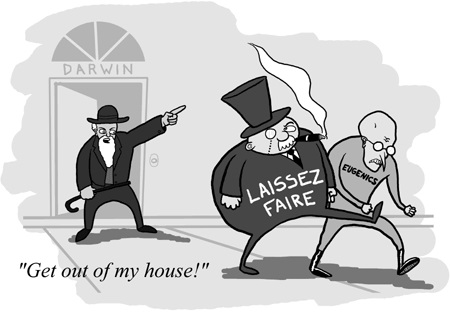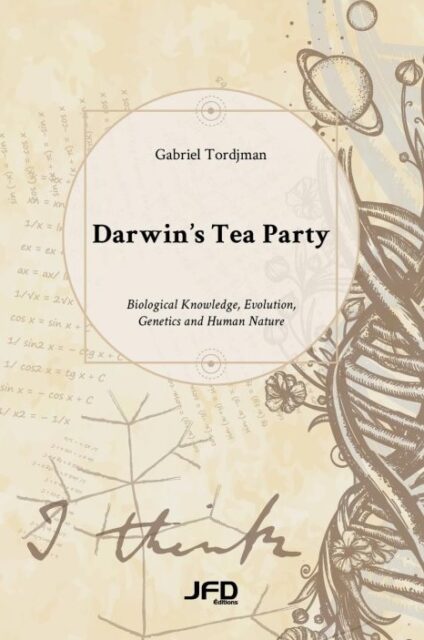Darwin’s Tea Party: An Interview with Gabriel Tordjman
The following is an interview with author Gabriel Tordjman on the subject of his new book Darwin’s Tea Party: Biological Knowledge, Evolution, Genetics, and Human Nature. Editions JFD: Montréal, 2020.
Q: What inspired you to write this book?
A: I’ve always been fascinated by life and by ideas as to what life was about. By “life” I mean actual living beings or creatures. Indeed, in human history, this “mystery of mysteries”, as Darwin calls it, was one of the last things to be scientifically explained. In university I discovered Darwin who explained the origin of living things from a scientific standpoint. This drew me into the fascinating and often controversial history of ideas about life. When I became a teacher at Dawson, I realized just how difficult it was for our students to enter this fascinating world. There just weren’t very many books which could introduce novice readers to these ideas with a minimum of jargon but I really wanted to share my enthusiasm about this topic with them and I knew at least some of them would get as fired up about it as me, if only they could get a ticket in. So I wrote this book as “ticket in” so to speak, to the world of the history of ideas with the fondest hope that I would be able to prep at least some of my students who might also get the bug and go on to spread it themselves (Wait – is this an inappropriate metaphor for these COVID days!?). I also wanted to pass on a good story – the story of their society – reflecting the viewpoint of an older generation about what life was about as far I could understand it and in hopes they would constructively challenge or even poke holes in it.
Q: What is ‘biological knowledge’ and why is this concept important?
A: Biological knowledge simply means knowledge of the living environment in its widest meaning and although notions of exactly what is “living,” what is “knowledge” and what is not have changed, I think everyone will agree this kind of knowledge has been vital (pun intended) from the very dawn of humanity right up until our time. It includes basic things like knowledge about the living things hunters hunted and gatherers gathered. What were the nutritional, medical, poisonous and even psychotropic properties of the living things around us? Whatever knowledge people had of such things in those days, it was surely crucial to their survival. Then, when humans began cultivating and domesticating plants and animals, this knowledge revolutionized society and set us on the path to “civilization” and the world we have today, for better or worse. Our biological knowledge has grown so powerful we are now on the verge of remaking our own biology and perhaps transcending our humanity, becoming perhaps a new species entirely. I think everyone can agree that biological knowledge has been as important as knowledge of how to construct stone or metal or other tools or technologies not derived from knowledge of living things. We can see how today biological knowledge confronts us quite directly with questions about what it means to be human and whether our intelligence will soon be rivalled or overtaken by that of the machines we create. Are we ourselves increasingly becoming machines? A look into the past can help us understand what is happening now and at least remind us of the need to temper and infuse our knowledge with a dose of ethics, humility and humanity.
Q: You mention in your introduction that you seek to provide a ‘more accurate interpretation’ of Darwin’s theory of evolution – how has this theory been misinterpreted?
A: Many of us are aware of how easy it was to twist Darwin’s ideas into justifications for imperial conquest, ruthless exploitation and oppression of the lower classes and even ideas of racial hierarchy and conflict. It would be great if we could just say that all of this was not Darwin’s fault and not part of his own scientific theory but was simply a distortion of it wrought by other hands. But I am not certain this is completely correct. Just about everyone in those days believed in the inevitability and the rightness of the conquest by western civilization over other cultures, whether in its much vaunted material, religious and scientific and technological aspects. Darwin was better than most and was a passionate opponent of slavery and saw clearly how the instinct of compassion was one of humankind’s noblest attributes. But even he could not escape from the assumptions of his time that made him see the march of empire as somehow equivalent to a survival of the fittest.
 At the same time, we need to understand what Darwin does not say. Thus “the struggle for survival” is not simply as many thought, a ruthless battle to the bloody end whether in humanity or nature, but what Darwin called “dependence of one being on another” or even “mutual aid” as the Russian evolutionist Kropotkin put it. So we need to give Darwin his due in understanding that evolution was not simply a justification for “the right of the stronger” but we also need to see how few are immune from the assumptions and prejudices of their times. We need to understand just how thoroughly “the times”, to put it vaguely, could blinker even the wisest person and the sharpest scientists. This just might help us see how our own time blinkers us today.
At the same time, we need to understand what Darwin does not say. Thus “the struggle for survival” is not simply as many thought, a ruthless battle to the bloody end whether in humanity or nature, but what Darwin called “dependence of one being on another” or even “mutual aid” as the Russian evolutionist Kropotkin put it. So we need to give Darwin his due in understanding that evolution was not simply a justification for “the right of the stronger” but we also need to see how few are immune from the assumptions and prejudices of their times. We need to understand just how thoroughly “the times”, to put it vaguely, could blinker even the wisest person and the sharpest scientists. This just might help us see how our own time blinkers us today.
Q: Many of the concepts discussed in your book are scientific, what do the humanities add to this discussion?
A: There are two attitudes I often find among students and other people on this issue. The first comes from the world of science. Let’s call it the scientistic view. When you are engaged in science, you just don’t have the time or inclination to examine the wider ramifications of what you are doing. You are busy trying to support your hypothesis or fashioning experiments or what have you. At the same time, one may fall in love with the exactness and precision of science, and this is especially true of people who are looking to education for clear answers as to what it’s all about and don’t find it in the messy world of humanities, social sciences or life itself!
Another viewpoint I often find is from outside of science, so to speak, which sometimes tends to fear science or imagine it as impossibly hard, obscure and mysterious. For these folks science may be like some black box that mysteriously and periodically winds up creating miracles like computers or smart phones or COVID vaccines or horrors like atom bombs, etc. In other words, it is somewhat of a god whose thinking and actions are beyond human understanding.
There is a danger in both views. In the first place, the scientistic view, as in any other kind of specialization, tends to forget or downplay the other domains of existence such as physical education, art, music, literature, politics, ethics. Indeed, it may look with disdain at some of these as hopelessly confused, messy, subjective, and a waste of time and energy in our modern scientific world. Such beliefs not only make you miss out on huge swaths of human activity but can turn you into a kind of “techno barbarian”: perfectly knowledgeable about one little thing but ignorant of everything else. Indeed, this kind of person is able to work quite well, creating even more massive nuclear weapons or inventions that spew deadly toxins into the air without ever questioning what he or she is doing. There is no ethical or critical thought, there are only puzzles to solve.
On the other side, we have those who look at science if it were something like a god, perhaps not realizing that the success of modern science tells us something about some basics of good thinking like the use of logic, fact and testability of our hypotheses. This is not just something that belongs only in a science class but is something all of us need to learn, especially these days!
We can see that humanities can teach both cases. In the first case, it can open our eyes to the wider domain of human society, make us learn about how powerfully science can effect the entire society and how we have moral obligations to think about and question the world we live in and our role in it. In the second case, we can learn the importance of logical argument and critical thought so we can discern truth from falsity and fact from fiction. But we also that science is a human activity and vulnerable to error and misuse and that, again, we need to use our critical thinking to help us think not just about where we are but about where we should go. In other words, to develop ourselves in the fullest ways possible, physically, intellectually, aesthetically and ethically – so that our scientific advance is tempered by humanistic care and empathy.



